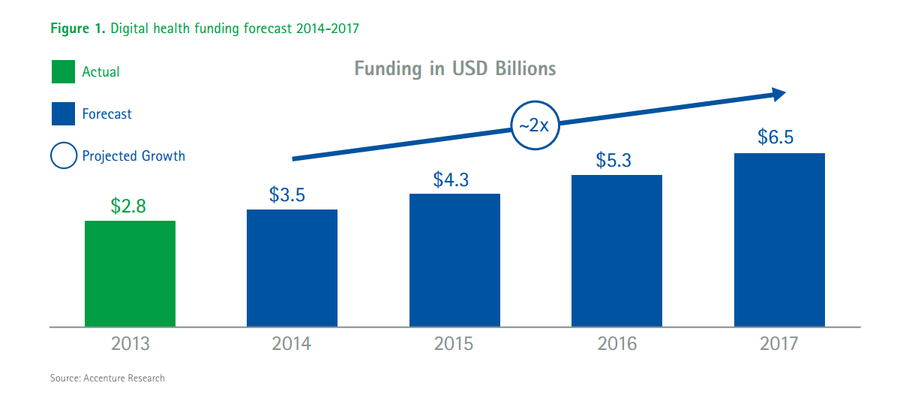
Digital health funding is expected to double in the United States over the next three years, growing from $3.5 billion in 2014 to $6.5 billion by the end of 2017, according to new research by Accenture. The forecast is based on market analysis, project experience, third-party analysis and data from 2,000 digital health start-ups receiving funding between 2008 and 2013.According to Accenture, an estimated $2.8 billion was used to fund digital health start-ups last year, growing at an annual rate of 31 percent since 2008. Research reveals that opportunities to “fix” the US healthcare system will continue to accelerate digital health funding.
“A digital disruption is playing out in healthcare that will change social interactions, alter consumer expectations and, ultimately, improve health outcomes. This momentum will be sustained if digital healthcare start-ups apply capabilities that create a seamless patient experience and result in both medical cost savings and improved outcomes,” said Dipak Patel, managing director of Accenture’s patient access initiatives in a statement.
Digital Health Funding Market Drivers
Accenture research found the following five key drivers sparking business opportunities and digital health funding:
| Driver | Description | Magnitude |
| System ‘Waste’ | Aging and chronically ill population, economic incentives and immature technology create waste and opportunity |
^^^ |
| Physical/Digital Blending |
Creating a seamless physical/digital experience through combinations of SMACS capabilities |
^^^ |
| Industry Newcomers |
Non-traditional companies entering the healthcare space | ^^ |
| New Investment Models |
New funding sources (e.g., KickStarter) and models (e.g., RockHealth) limiting barriers to entry for start-ups |
^^ |
| Social Motivation |
New generation who want to impact healthcare and social causes | ^ |
The research found that between 2008 and 2013 startup funding totaled $10.2 billion for digital health solutions addressing four market segments:
- Infrastructure capabilities, such as interoperability and health analytics, accounted for an estimated $2.9 billion in start-up funding, which was used by organizations to comply with industry changes and federal Meaningful Use guidelines.
- Engagement solutions, such as wearable technology and incentive programs targeting behavioral change among patients, received $2.6 billion in start-up funding.
- Treatment tools, which enable alternative care channels by leveraging technology, such as telehealth, also received $2.6 billion in start-up funding.
- Diagnosis technology captured $2.1 billion in start-up funding, representing a rapidly growing segment of clinical and consumer tools, such as remote monitoring, that provides practitioners with real-time insight.
Through 2017, Accenture predicts that stand-out organizations, and their applications, will succeed through the linkage of capabilities across these four segments. Emerging technologies will include clinical applications that meet regulatory approval and solutions with more advanced analytics capabilities (e.g., quantum computing).
